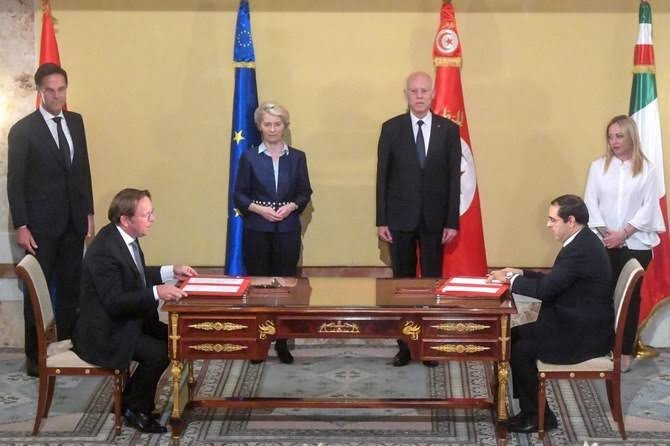EU, Tunisia forge “Strategic” partnership to address migration, boost economy

The European Union (EU) and Tunisia have signed a memorandum of understanding, marking a “strategic and comprehensive partnership” focused on addressing irregular migration, fostering economic development, and promoting renewable energy. This agreement, which includes financial assistance, comes at a time when Tunisia has faced criticism for its treatment of migrants and racial tensions within the country.
The North African nation, facing economic challenges, serves as a crucial transit point for migrants attempting to reach Europe. However, since February, Tunisia has witnessed an increase in racially motivated attacks and tensions surrounding migration. The situation escalated further after a Tunisian man lost his life during clashes between locals and migrants in Sfax on July 3. Subsequently, hundreds of migrants were either displaced or forcibly evicted, leaving them stranded in desert areas along the Algerian and Libyan borders, exposed to scorching heat and harsh conditions.
At the Tunisian presidential palace, European Commission President Ursula von der Leyen emphasized the importance of effective cooperation, stating that the accord seeks to “invest in shared prosperity.” Von der Leyen highlighted the need to collaborate against smuggling and trafficking networks, as well as enhance search and rescue operations. Notably, she was joined by Italian Prime Minister Giorgia Meloni and Dutch counterpart Mark Rutte, who had previously engaged in discussions in Tunisia to explore ways to manage irregular migration.
Given its proximity to the Italian island of Lampedusa, Tunisia has long been a departure point for migrants embarking on perilous sea journeys in search of a better future in Europe. Disturbingly, the International Organization for Migration reported that 2,406 migrants died or went missing in the Mediterranean Sea in 2022, with at least 1,166 deaths or disappearances recorded in the first half of 2023.
Expressing her satisfaction, Prime Minister Meloni welcomed the new agreement as a significant step towards addressing the migration crisis. She extended an invitation to President Kais Saied to participate in an international conference on migration scheduled for July 23. Prime Minister Rutte also acknowledged the mutual benefits for both the EU and Tunisia, highlighting the EU’s status as Tunisia’s largest trading partner. The partnership will encompass financial aid to Tunisian schools and initiatives promoting renewable energy.
In response, President Saied stressed the need for a collective agreement to address inhumane immigration and the forced displacement of people by criminal networks. Saied maintained that Tunisia had shown “unlimited generosity” in assisting migrants. However, just hours before the agreement was signed, AFP correspondents at the Tunisian-Libyan border observed dozens of exhausted and dehydrated migrants stranded in a desert area, claiming to have been taken there by Tunisian authorities.
Earlier in June, von der Leyen pledged 105 million euros (approximately $115 million) to support measures aimed at curbing irregular migration, along with immediate support of 150 million euros and a long-term loan of around 900 million euros. However, the disbursement of the long-term loan is contingent upon the approval of Tunisia’s stalled $2 billion loan from the International Monetary Fund (IMF). President Saied has repeatedly rejected what he calls the “diktats” of the IMF, citing disagreements over lifting subsidies on basic products and services, as well as restructuring state-owned firms.
President Saied emphasized the need to find alternative avenues of cooperation beyond traditional monetary institutions established after World War II. Tunisia is grappling with crippling inflation and a debt burden estimated to be around 80 percent of its gross domestic product.
Reports from the Tunisian-Libyan border indicate a growing number of migrants, with border agent Mohamad Abou Snenah confirming daily increases. Ibrahim, a Congolese migrant who resided in Zarzis, Tunisia, shared his ordeal of being abruptly detained on the street and then abandoned in the desert for several days.
Human rights groups in Tunisia reported that approximately 100 to 150 migrants, including women and children, remain stranded on the border with Libya. The Tunisian Red Crescent has stepped in to provide shelter for over 600 migrants who were recently taken to the militarized zone of Ras Jedir on the Mediterranean coast.
As the EU and Tunisia forge this strategic partnership, their joint efforts will seek to tackle the challenges of irregular migration while fostering economic growth and sustainability.







